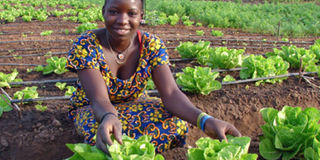How to practice climate smart farming with ease

Experts say irrigation is one of the best methods for maintaining crops . PHOTO BY Rajab Mukombozi
Farming and environment The continued unpredictable weather pattern is largely due to environmental degradation that impacts negatively on farming. But whereas farmers are directly affected by the effects they have not been mindful of conserving the environment.
“You cry of drought, lack of water but what efforts are you putting up to mitigate climate change effects. You are instead clearing all trees to have your farms clean that even your cows can’t get a shade, its high time farmers stood at the helm of environmental protection,” noted Dr Constantine Katongole from Makerere University and a guest researcher at the Swedish University of Agricultural Sciences
Pasture management
Most farmers have been dependent on naturally grown pasture. However, to be successful in stock farming, dairy farmers need to note that the growing of pasture and management is vital.
With changing weather patterns, pasture management remains significant especially pasture growing, harvesting and storage.
Dr Charles Lagu of Mbarara Zonal Agricultural Research and Development Institute (MBAZARDI) said the way to go now especially with dairy farming is to grow different pasture species in plenty, harvest and store it.
“Farmers need to know that the traditional way of doing things like depending on natural grown pasture is no longer relevant in farming, they have to grow different types of grass in plenty, harvest and store it to have enough feeds for their livestock throughout the year,” said Dr Lagu.
Soil testing
With the dwindling soil fertility levels, most farmers have resorted to the use of fertilisers. Most farmers simply buy fertilisers without taking into consideration the type of crops or nutrient requirement.
There are few testing facilities in the country such as Palintest. “Soil testing is vital for agricultural and horticultural management. It’s helpful in determining the type of crop to grow and the fertiliser that is lacking. Before you add a fertiliser, you first need to test your soil and know the exact amount of fertiliser to apply,” said Caroline Akampa, an agronomic consultant.
She said Palintest does soil testing at Shs20,000 per acre and their services are spread across all the four regions of the country. However she said acquiring a soil testing kit costs between Shs3m and Shs9m.
Irrigation
With the unpredictable weather conditions especially prolonged drought, the farmers were informed not to depend on nature but undertake irrigation. The farmers were told that simple irrigation is possible for every farmer to sustain production throughout the year.
“They are simple irrigation techniques that every farmer can afford such as drip irrigation especially on annual crops .Without irrigation, sustaining farming is proving a problem so every farmer should be prepared to harvest and have a source of water for farming. We can no longer depend on nature to survive in farming,” advised Dr Amos Aturinda.
Seedlings selection
Traditionally, farmers used to get seedlings from neighbours, but with the growing challenges affecting farming such as pests and diseases, climatic change and weather effects, farmers now need to be careful when selecting seedlings.
“Don’t go for seedlings because you have admired, some of the seedlings we develop here are targeted for example for a particular region but some of you get these seedlings and when they fail you start blaming us,” said Dr Halid Kirunda, the director Research at MBAZARDI.
Farming as a business
Farmers continue to make losses and remain stuck in terms of social –economic transformation because they do not take farming as a business.
Most farmers do not draw plans to understand what is possible and manageable such as adequate capital, expertise, where to buy inputs, market and as such they just undertake projects without careful consideration and are always making losses.
Dr Stephen Lwasa, an agricultural economist says farmers have to develop business plans and analyse their enterprises in terms of budgeting, production, market, human resource, finances, risks and uncertainties and how to reduce them among others.
He added that record keeping remains an important tool in production and marketing.
Working together
Most farmers are cheated by middle men because each farmer tries to do business independently.
Experts say farmers need to appreciate that working together especially on marketing gives them a bargaining power and can fetch better prices and avoid exploitation by middlemen.
Sedrach Muhangi, a banana expert at MBAZARDI, told famers that collective marketing is the best option to avoid exploitation.




